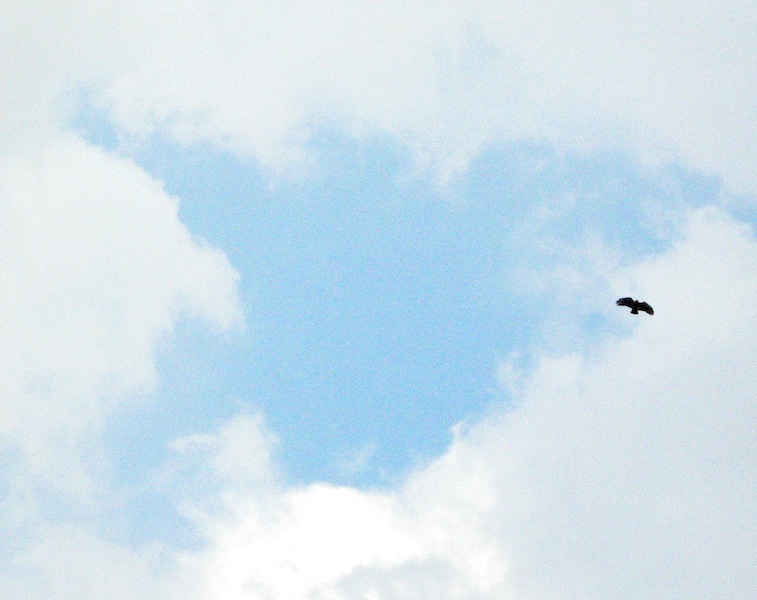A man in an owl mascot outfit is feeding pigeons on the steps of a downtown Toronto church. It’s a surreal scene captured by one of the sex workers participating in the Exposure Project, a new program that puts cameras in the hands of women working the streets.
“It’s an incredible shot,” notes Kaleigh Middelkoop, one of two female photographer-mentors who volunteered their services to teach 12 sex workers, some who are now off the street, to frame the world they live in.
“The mascot guy looked so sad. And, just imagine that she bothered to stop and took the time to take the shot. I love it so much.”
The resulting photographs have been curated and picked over, resulting in about three dozen pictures selected for a special auction to be held at St. James Cathedral (65 Church Street) on Friday, May 31 at 8 p.m.
Funds raised from the auction will go back to the centre, and to keep the project going next year.
Middelkoop, 21, said she was intrigued by the project after moving to Toronto for a photography job. Graduating from a college in Ottawa a year ago, the Newfoundland native found herself in the big city — eager to connect.
“I wanted to ‘use my powers for the good,’ so to speak,” she says. “And, you really have to understand something if you’re going to teach it — [in a way] it was doing two things.”
Middelkoop talks breathlessly about the project — the brainchild of the All Saints Church-Community Centre, located in one of Toronto’s most hard-bitten neighbourhoods, the Dundas and Sherbourne corridor. The centre provides many services — including meals, workshops, health care and counselling — for those on low-income, the homeless and sex workers.
“No one ever thinks of sex work and the trade,” says Middelkoop. “They pass it every day and they’re not aware of the realities of it.”
Over a two-month period in the early spring, a dozen sex and former-sex workers were provided point-and-shoot cameras as well as weekly sessions with two photographers through the Women’s Drop-in Centre at the church. Middelkoop and fellow lenser Galit Rodan gave basic pointers on lighting, composition and framing. Every week the women would come back with hundreds of photos, which Middelkoop and Rodan would critique and use to provide guidance.
“They come back and they have images that blow you away,” recalls Middelkoop. “Some of them have no idea how talented they are. They are naturals. They just took to it.”
‘I’m still a person with feelings and dreams’
Deborah Belcourt, a former sex worker in her 40s who now works as a peer outreach worker at the centre, was one of the dozen participants. She was mentored by Middelkoop.
Belcourt says she decided to join the program in order to “take pictures of what is so prevalent in this city,” i.e. prostitution, addiction, homelessness and mental illness. It was also a way, literally, of laying bare who she is.

Photo: Deborah Belcourt
“Even though my life has seen addiction, homelessness and mental health, I’m still a person with feelings and dreams. I’m educated. I work, I take art and writing classes,” she points out.
“The lessons I’ve learned, places I’ve stayed and stories I’ve heard are things I’d never change.”
Belcourt says learning how to create an image has given her “excitement and purpose,” providing her a powerful channel for self-expression.
“Pictures really do say a thousand words.”
Middelkoop — whose sense of satisfaction mirrors the town she’s from, Heart’s Content — says she went through a learning experience, too: “I almost felt selfish being there because I felt so fulfilled. [These women] are more than their labels. They are very strong women. Survivors. And they’re capable of great things if given the opportunity.”
The photographer says she hopes the images will compel the general public to consider “these women as their peers.”
“They deserve the respect and time that you would want anyone to give to you.”
For Belcourt, the program bestowed something that could not be measured: “To be able to show people that we matter, in a way that can’t be ignored, goes far beyond words ever could.”
The Exposure Project’s photographs will have a starting price of $100 each. Organizers are hoping to raise at least $10,000.
If you’re unable to attend, you can always go to the website and donate: https://exposureproject.blossomr.com/
June Chua is a Toronto-based journalist who regularly writes about the arts for rabble.ca.
Photos by Deborah Belcourt.



